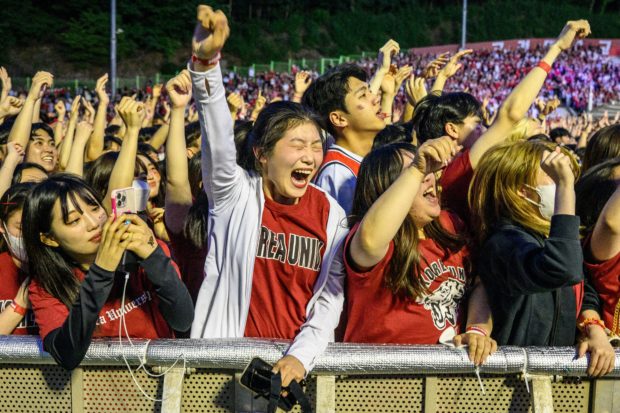From ‘anti’ to ‘V Live’: A K-pop glossary for newbies

In this picture taken on May 27, 2022, fans react as they attend a concert by South Korean rapper Psy at the Korea University in Seoul. Image: AFP/Anthony Wallace
Newcomers to the K-pop world will often find themselves lost in an online culture riddled with inside jokes, confusing terms and a unique vocabulary.
Agence France-Presse takes a look at some of the most common K-pop terms:
K-pop
Korean popular music, or “K-pop,” is the genre of music originating from South Korea.
Originally sung in Korean — but now often in English — K-pop songs may have musical elements from hip hop, electronic dance, jazz or rock.
It is mostly performed by boy bands and girl groups. Key components include tight choreography, high production values and original concepts.
Anti-fan
Also shortened as “anti,” it refers to someone who hates a particular celebrity so much that they devote their time to mocking and criticizing that artist.
Comeback
A K-pop “comeback” means a group releasing new music or an album — with no long passage of time required.
Often a multi-step process, a comeback is teased out for weeks with images, videos, and in some cases, even pre-album singles.
Fan chant
These are words shouted by fans during performances.
A chant usually includes naming all the members of a group during the intro and then repeating specific words or lines throughout a song.
The chants are often tailored to specific songs.
Fingerheart
A gesture of forming a small heart shape with thumb and index fingers.
It is frequently used by K-pop artists to express their fondness towards their fans.
Idol
An “idol” is a K-pop star who has been trained before “debuting” — releasing their first music — through an entertainment agency.
Idols can be solo artists or members of a group.
Leader
Most K-pop bands have a designated “leader” who is responsible for guiding and overseeing the group.
The person usually starts any public introductions off and will be the first to speak at events.
Lightstick
Don’t dismiss them as mere glow sticks.
K-pop lightsticks have evolved to become symbols of the fans’ devotion to their artists.
They are custom-made for many groups, and fans show their unity by waving them at concerts.
Sasaeng fan
The super-obsessed fan who goes over the top for the attention of their favorite K-pop artist.
In Korean, “sa” means private and “saeng” means life, referring to the fans’ intrusion into the stars’ private lives.
In some cases, this may amount to borderline criminal acts, such as breaking into their homes, stealing their personal items or information, and sending inappropriate gifts such as lingerie.
V Live
If you want to keep up with your favorite K-pop star, “V Live” is a must.
It’s a livestream platform used by most K-pop idols to connect with their fans.
Some upload behind-the-scene footage, while others use it to livestream after shows. AP/JB
RELATED STORIES:
Nine years at the top: The unstoppable rise of BTS
K-pop pioneers BTS time out leaves fans tearful, investors irate